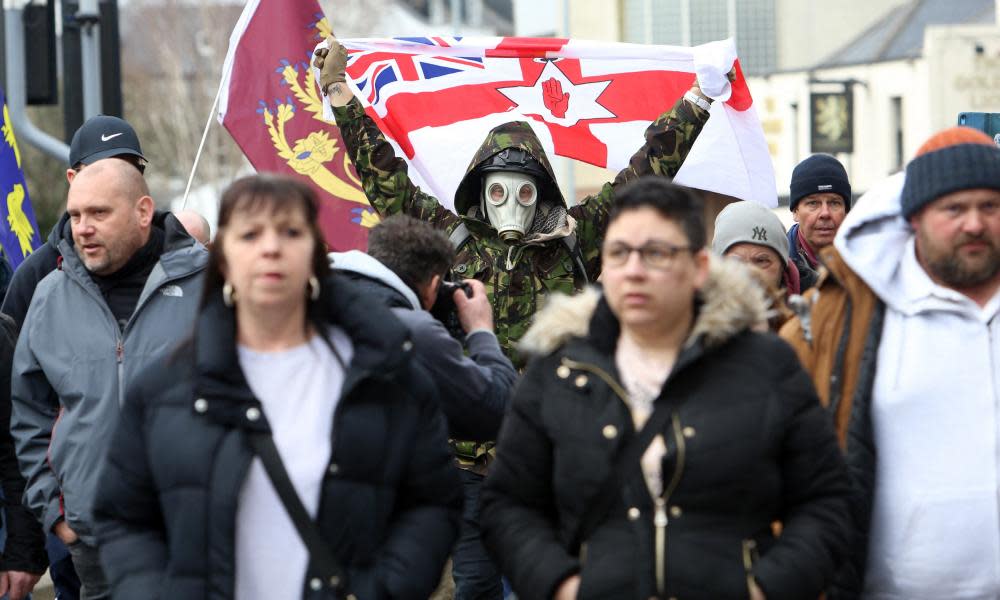Why are Ireland’s anti-refugee protests erupting now? Look across the Irish Sea

After years of bucking the European trend, an organised anti-refugee backlash has finally hit Ireland. Recent protests involved threats to burn down a hotel housing refugees and, in a separate incident, there was a vigilante attack on a homeless migrant camp. These ugly scenes followed months of protests led by the far right and simmering community tensions over the provision of local accommodation to refugees. But where has this come from?
Not previously high on the agenda of voters more concerned with a crumbling, two-tier healthcare system and a chronic housing crisis, a recent poll found that a small majority (56%) of Irish respondents believe the country has accepted too many refugees over the past year.
Ireland is currently housing about 74,000 asylum applicants, 49,227 of whom are Ukrainians. A year ago, the total number was 7,500. Hotels, emergency shelters and improvised accommodation centres across the country are practically full. And what is sometimes forgotten is that the number of non-Ukrainian applicants is also the highest in decades, mirroring a Europe-wide trend of rising asylum claims.
As seen during the water charges revolt and through the popularity of the policies of Sinn Féin, mass anger has, in recent memory, largely been directed at the ruling parties, which bailed out the banks and the bondholders on the backs of the Irish working and middle classes before unleashing austerity under the guise of a post-crash recovery. Now anti-refugee sentiment has exploded amid a devastating housing crisis, made worse by the destabilising effects of public sector cuts and stagnant wages.
With the asylum system at breaking point and fury building at these national maladies, anti-refugee protests and the febrile discourses that swirl around are potentially signalling the birth of a new political energy that could impose itself on future elections in Ireland. On closer inspection, they also demonstrate the importation of anti-refugee arguments from across the Irish Sea.
These protests have drawn from the same rhetorical, tactical, and ideological energy as the recent anti-refugee riot in Knowsley, England. The most commonplace and persistent anti-refugee narrative concerns “unvetted” or “military age” young male refugees, who are depicted, because of their age and gender, as inherently unsafe to the public, especially women. As a recent poll indicated, women in working-class communities are more strongly against integrating refugees than men.
Preying on these fears, Irish far-right activists are disseminating false information about criminal activities. Proliferating through social media on any given day are rumours of sexual assault or the harassment of women by migrants, or grainy, unverifiable video clips of the same. A security source recently told the Irish Times that this is “a mirror image of what has been happening in the UK”.
At the level of street agitators and online provocateurs, the links are clear. Tommy Robinson was welcomed to Ireland in February by some far-right activists. Online, some of the Irish far-right’s leading lights have appeared on the Off-Grid Ireland YouTube channel with activists from Patriotic Alternative (PA), one of the most active fascist movements in the UK. PA founder and Adolf Hitler admirer Mark Collett and another key figure Sam Melia recently went on the same channel to express their hope that PA tactics and ideas could be reproduced in Ireland.
Then there are the suit-clad personalities who are more interested in electoral successes than street politics. First coming to the fore in the 1990s as one of the faces of the anti-abortion campaign group Youth Defence, Justin Barrett founded the Irish National party in 2018, which advocates for the reversal of migration policies. Meanwhile, Hermann Kelly, the president of the anti-EU Irish Freedom party, supports taking back control of Ireland’s borders and migration policy. And he also is the director of communications for Europe of Freedom and Direct Democracy, of which Nigel Farage was co-president.
Many branches of the Irish right nurture the same obsessions as their English and broader European counterparts. Adherents are, as a recent micro-party’s foundation indicates, “Ireland First” in orientation. They are in favour of housing the “ethnically Irish” first, they are disdainful of globalist elites, leftwing politicians and NGOs. In certain dark corners, there are explicit calls to violence and ethno-nationalist tropes about the “great replacement theory”.
Yet while the culture war playbook is remarkably consistent across national borders, there’s a specific irony to its expression in Ireland. Irish nationalist arguments, bound up in a history of independence struggles, have never been held from the fringe but have been centre stage in Irish politics. And whether for opportunistic reasons or for ideological affinity, Irish nationalists often forged alliances with fellow small nations and anti-imperial struggles around the world, not groups of fanatics who dream of racial purity or the reinarcanation of the British empire.
In reality, the far-right menace remains small. But the spread of the contagion could provide a challenge from the right as Sinn Féin feathers itself for power for the first time in the Irish republic . Growing anti-migrant sentiment could benefit the more hardline immigration policies of parties such as Fine Gael.
Only time will tell, however, if the anti-immigration consensus seen in large parts of Britain can be replicated in Ireland.
Colin Gannon is an Irish journalist based in London
Do you have an opinion on the issues raised in this article? If you would like to submit a letter of up to 300 words to be considered for publication, email it to us at guardian.letters@theguardian.com

 Yahoo News
Yahoo News 
